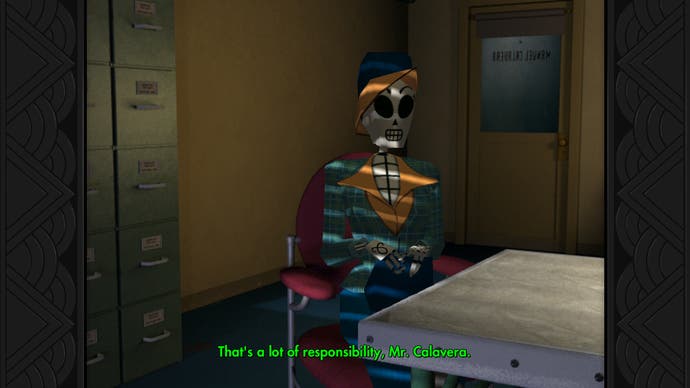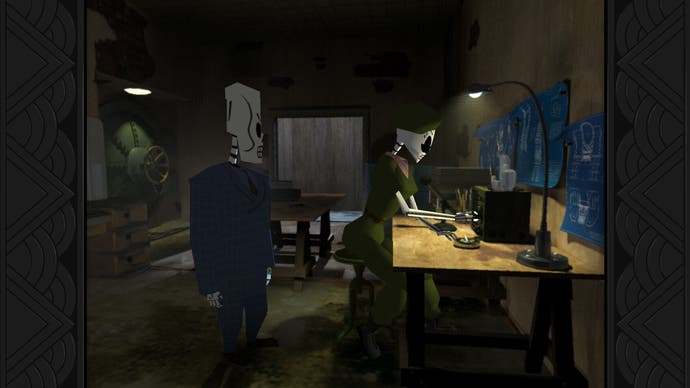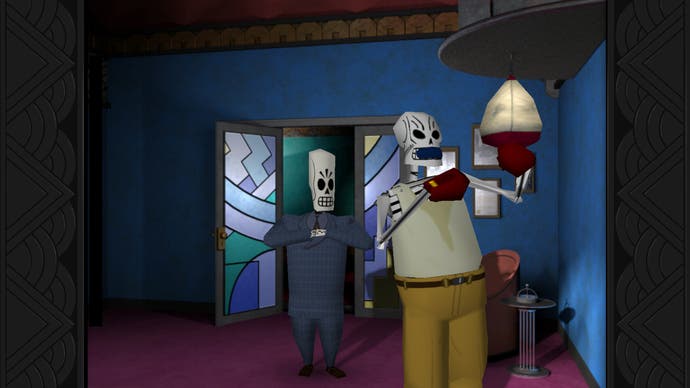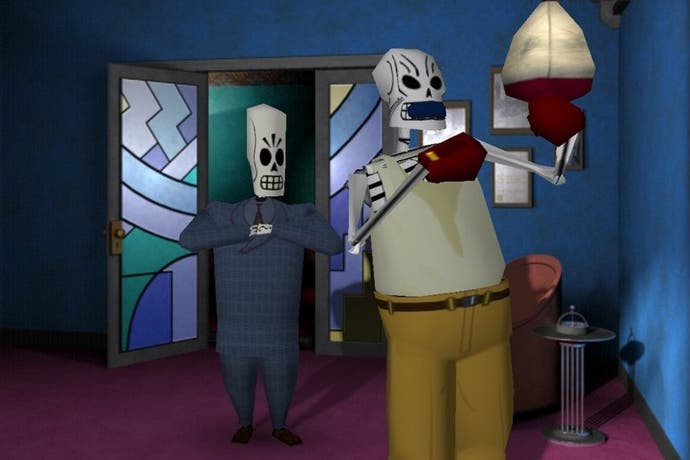Bringing out the Dead: Tim Schafer reflects back on Grim Fandango
"It was a crazy perfect storm of amazing artists that came together."
Grim Fandango is finally being re-released tomorrow after being stuck on CDs since its October 1998 launch. Never available for console or digital download, many thought the cult classic would remain a rare collector's item for adventure game enthusiasts. When a special edition of LucasArts' arguably best-known adventure, The Secret of Monkey Island, came out in the summer of 2009, it led many to believe that Grim Fandango would follow. Yet years went by without so much as a whisper of a re-release. When Disney acquired Lucasfilm on Grim Fandango's 14th anniversary in 2012, many thought it was a lost cause. Disney is notorious for its family-friendly fare, so a tale of crime and corruption with liberal use of drinking, smoking and sexual innuendo didn't exactly fit the house of mouse's modus operandi.
Yet here we are, over 16 years later, with Grim Fandango remastered for a modern audience. What happened? And why did it take so long?
Speaking to Grim Fandango's project leader, Tim Schafer, it was simply a matter of him being inundated with other projects at his studio Double Fine Productions. "One of the main reasons it took so long is I've been busy with other things, making new games and pursuing other stuff," he tells me over Skype. "I've always been interested in some day going back to the old properties, but we've been pretty busy."
This makes sense as Double Fine has had a rather full plate over the last decade plus with such titles as Psychonauts, Brutal Legend, Costume Quest [1 & 2], Broken Age, Iron Brigade, The Cave, Once Upon a Monster, Kinect Party and more under its belt with Broken Age: Act 2, Massive Chalice and more on its way.
"We'd be reminded of it every once in a while when a [new] president would come in at LucasArts and start doing stuff with what they called the Legacy Properties like the Special Edition of Monkey Island. It would remind us that there's something to be done there," Schafer says. "I think the Disney acquisition just reminded us once again that those things are just sitting there."
Even when Schafer decided to pursue remastering Grim Fandango, that didn't mean it was going to happen. "I didn't get my hopes up because when you have a lot of big companies with bigger fish to fry, the odds of breaking through are slim. But our COO, Justin Bailey, kept at it for like a year while I was working on Broken Age and eventually hooked up with the right people at every company; the people who were really passionate about the old adventure games and remembered playing them when they were younger and wanted to see them brought back for the current fans of today."
But it wasn't quite this easy as Schafer heard competition to license Grim Fandango was fierce. "We didn't think we'd be able to do it as we'd heard someone else was trying to do it, and we were like 'oh no!'" When asked who this mysterious competitor was, Schafer says "It turned out to be Adam Boyes [VP of publisher & developer relations at SCEA]."
"Adam was like, 'we weren't trying to mess anything up. We just wanted to make that game come out again," Schafer recalls. "And we were like, 'Us too! But we think we should do it because we can remaster it the way it should be done.' And they agreed, so we decided to work together." Schafer notes that there were other companies vying to license Grim, but Sony came the closest.
All's well that ends well. But let's take a moment to reflect on Grim Fandango. I've already espoused its virtues in a retrospective, but how's it hold up to the man who helmed it? "Looking back at Grim, what are you most proud about?" I ask.
"I'm proud of so many things in Grim just because it was a crazy perfect storm of amazing artists that came together to work on it. I mean the visual artists, but also the musicians and the actors and the designers," he says. "Everybody who contributed to that game it was a crazy mix of extraordinary talent."
That's a good general response while he stalls for a more specific answer, and then it hits him: "I'm proud of that character Manny."
Ah Manny Calavera, the travel agent protagonist of Grim Fandango. There's a lot to say about Manuel Calavera. He's witty, charming, downtrodden, scheming, and oddly sweet. But there's another thing that sticks out to Schafer about Manny. It's something we take for granted today: Manny is latino.
"It was funny because when we first were discussing with Dara, our voice director, what he'd sound like, there was this question of 'should he have a Spanish accent?' It seemed like it would take guts to do that back then, which is crazy now because you can't think about doing it any other way. I mean how could Manny not have a Spanish accent? But at the time there hadn't been a lot of characters like that. So it seemed like a bold thing to do, but now it seems totally obvious."
Of course Schafer made the right choice here, not just by giving Manny an accent, but by casting the perfect actor for him: Tony Plana, a native Spanish speaker. "He brought so much natural dialogue to the game," Schafer recalls. "Like I'd write a lot of dialogue where Manny would say, 'Hey Glottis' or 'Hey buddy' and Tony would say, 'Can I have Manny say something different there? Like carnal [first cousin] or hermano [sibling] or some more natural thing that a Spanish speaker would say?' So he added a lot of Spanish language into the English version of the game."

So if that's what Schafer's most proud of, what's he most embarrassed by?
"There was a very controversial issue of the controls with that game," he says. "I was a big proponent of 'tank controls', which were very popular at the time with Tomb Raider, Resident Evil, BioForge [etc]. A lot of games had you controlling this very character-centric left/right/forward/back control scheme. And I thought it was really great because you could sort of move through a scene cinematically and do a lot of camera cuts without changing how the player pushed the joystick around... I got so used to them that I thought they were the most natural and intuitive way to control a character, but a lot of people did not think so and they thought it was really hard to control Manny. So in the new remastered version we're correcting that and giving the player a lot of options."
Indeed this remastered release has camera-relative controls, point-and-click controls (with touch-screen support on the Vita), and the oldschool tank controls for purists. So which does Schafer himself use?
"I played through the PlayStation version using the DualShock 4 third-person camera relative controls. And it just works. I didn't realise I was doing it," he says. "I just picked it up and expected it to play like a modern game and it did. I didn't notice that these were completely new controls that people worked hard to make. On the PC I'd probably use the point-and-click controls though."
Schafer also notes that Grim's original release had a bug where a character wouldn't speak to you in the game's third chapter if you talked to him in the opening act. "I always wondered why people were so confused by the plot in Grim. And that's why! It was just a bug!" Naturally, this has been amended in the re-release.
Yet, even with these slight hiccups and a less than ideal availability, Grim Fandango has withstood the test of time. "Why do you think it's remained so beloved 16 years later?" I ask.
"I hope it's because they relate to the characters," Schafer says. "I hope it's because Manny and Glottis and Meche and Domino and all those characters feel real to them. And that the world feels alive to them and they want to go back to that world... I think it's also because of the quality of the presentation from the music to the beautiful backgrounds. "
"And there aren't that many games like it. There aren't that many games that have that kind of atmosphere or that particular type of story. Adventure games still explore unusual territory that most other games didn't explore. There weren't a lot of action games set in strange worlds like Grim Fandango... Or maybe it was just the tank controls. People loved them so much."

I tell Schafer that my favourite thing about Grim Fandango is the dialogue. Lots of games have attempted to recreate the 1940s noir vibe - LA Noire certainly comes to mind - but few, if any, have replicated that era's penchant for snappy banter. As it turns out, Schafer wrote the entirety of Grim Fandango's dialogue. All 8000-plus lines of it.
"At LucasArts I was just very controlling about dialogue. I still am," Schafer says. "With Broken Age I wrote all the dialogue. Working on the Monkey Island games I wrote like a third of the dialogue. It was fun. It was different. I loved working side by side with Dave Grossman and Ron Gilbert. But I secretly wanted to write all the dialogue."
Grim Fandango's lingo is heavily steeped in the 1930s and 40s, an era Schafer was obsessed with at the time. "I was constantly watching film noir and reading hard-boiled crime novels," hey says. "That's just what I liked. I just loved Raymond Chandler and Dashiell Hammett and I was watching all those movies all the time and I stole phrases from there. I guess I was just living and breathing it so it was natural that it would come out in the dialogue."
And hey, if you're going to write a talky game, is there any better time period for that than the 1930s and 40s? "I like how in those old novels and the movies there's something that I feel is really honest about the way people talked that's different than modern movies," Schafer says. "It can come off as very stiff and formal, but I feel like it's actually very raw and fresh in a way. The people talk about stuff in a way they don't anymore." He notes The Big Sleep, Casablanca and Double Indemnity as classic examples of the types of fiery barbs he admires. "I think my all-time favourite for dialogue is The Sweet Smell of Success. It's awesome. The dialogue is just so great!"
Speaking of his love of wordplay, one of Schafer's favourite achievements in developing Grim Fandango was coming up with its title. "It took weeks and weeks and weeks to come up with a name," he says. "The original title, when I was pitching it, was Deeds of the Dead, because it was going to be about real estate. Instead of a travel agent, Manny was a real estate agent. The Last Siesta was one [working title]. Dirt Nap I think was in there somewhere..."
"And then I finally came up with the name and was like, 'I'm so smart! This is the best name ever!' I remember I ran out of my office and I told someone and was like, 'What do you think of the name?' And they were like 'That's terrible. You'll never sell a game called Grim Fandango. What does that even mean?' But I've always loved it."
Those who have played Grim Fandango will likely remember that the title is used at one choice moment in the game. Schafer notes that he came up with the title first, then wrote that passage around it. "I thought it was an evocative phrase that could be expanded," he says. "I mean Grim Fandango just as a metaphor for what? For life or death depending on how you're looking at it."

So with Grim Fandango back, could this mean Double Fine might expand upon the license in a sequel or spinoff?
"I haven't put a lot of effort into thinking about more Grim Fandango games just because that was a really cohesive, wrapped up story," Schafer says. "It was a cool world that might be fun to go back to, but I really feel that the arch of that story was complete. In certain games like Psychonauts we kind of left it wide open, so you could see more of that, but Grim I feel like is just a nice little bundle as it is. So really the emphasis was more 'let's polish that up and make it look nice and sound nice and play better.'"
"Don't get me wrong, if this game just blows up and everyone is talking about Grim, we'd think about it," he adds. "But I always thought if we went back to that world it would be maybe new characters."
As far as other old LucasArts properties go, he says he's not heard anything about Monkey Island as that's really Ron Gilbert's baby, and Gilbert's busy with Thimbleweed Park, his throwback to 1987 point-and-click adventure games. Elsewhere, Double Fine is already on duty to remaster Schafer's 1993 sequel to Maniac Mansion, Day of the Tentacle. But what about Schafer's other directorial effort at LucasArts, Full Throttle?
"As far as LucasArts games go, I think that would be a natural one to talk about, but I think we're taking it one step at a time because Day of the Tentacle is so different than Grim in terms of the tech," he says. "It's a lot more similar to Monkey Island in terms of the 2D painted backgrounds. Where Grim was about uncompressing things and doing new lighting models and changing the controls, I think DotT would be about increasing the fidelity of the paintings. Day of the Tentacle had like three places where it was a full screen animation and everything else was just a painted background with characters in front of it. But Full Throttle had that mine road, it had full screen animated cutscenes, so it's a lot more ambitious. So I feel like let's just start with Day of the Tentacle and see how hard that is."
"But if you can crack that nut, would you continue to Full Throttle?" I ask.
"I would love to," he replies. "If Grim and DotT do well I would love to keep going and do Throttle for sure."
Come unstuck? Don't miss our step-by-step Grim Fandango walkthrough.


